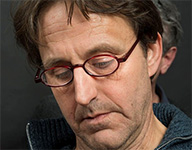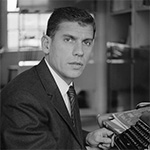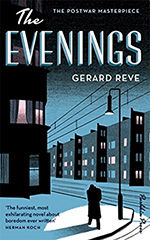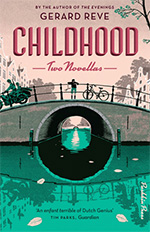A Conversation with Sam Garrett
He has translated more than thirty novels and works of non-fiction. His translation of Herman Koch’s Het diner in 2012 turned a Dutch book into a New York Times bestseller. Since then, the American born Sam Garrett went on translating seminal Dutch novels such as Turks Fruit (Turkish Delight) by Jan Wolkers, and Gerard Reve’s ‘untranslatable’ masterpiece De avonden (The Evenings, 2016).

Sam Garrett is the only translator to have won the British Society of Authors’ Vondel Prize for Dutch-English translation twice. His work has been shortlisted for the International IMPAC Dublin Literary Award, the Oxford-Weidenfeld Translation Award, the PEN Translation Prize and the Best Translated Book Award. One morning in April, we sat down with Sam Garrett to talk about his work, and about The Evenings in particular.

You have often mentioned how much De avonden means to you. Could you tell us a bit more about that?
The Evenings is an interesting case, because of its reputation and because of the fact that it had lain untranslated into English for seventy years. As I was learning Dutch in the early 1980s and working as a correspondent for a press agency in The Hague, people saw this foreigner who started to read things in Dutch, and they started giving me suggestions. At some point, somebody came along and said: “you really have to read De avonden by Gerard Reve.” So I did. I still have the copy I bought at a second-hand bookstore back then.
What was your first impression of Reve’s modern Dutch classic?
I was just amazed by the book, because in some ways it felt to me like a confirmation of what I was seeing around me as I was becoming accustomed to this new culture in the Netherlands in the 1980s. It was also completely new to me, I think partly because of the humour of the book. In America, I was very used to a different kind of humour and literature.
When did you first think of translating De avonden into English?
At that time, I was not doing any literary translation. I was still too new to Dutch to really even dream of that, or perhaps at least to seriously think about it. After a long time, that changed, and I started translating Dutch literature. I always somehow had De avonden in the back of my mind. I was amazed, as the years went by, to see that no one had snapped it up. There was of course this onus hanging over the book: abandon hope, translator! Still, if anyone would ask what book I really wanted to translate, I would say: De avonden by Gerard Reve. At one point, I believe in the late 1990s or the early 2000s, Peter Mayer, a big publisher in the United States, got the idea of bringing De avonden in an English edition. He had established a concours and asked a couple of translators to each translate a chapter. I did, but I didn’t win. I just saw my hopes blown right down the drain. I thought: there you go, Sam, that is the end of that dream.
Yet, Peter Mayer did not end up publishing it. We know that, during his life, Gerard Reve guarded his work with extreme caution and was very particular about how his work should read in English…
That is right. I never met Gerard Reve, which I am sorry about. I’m not sure that meeting him as the translator of his work would be an enviable position. I think Reve was very tough and very opinionated. I may not have cut the mustard for him either. I don’t know. Anyhow, to fast forward a bit in what is a rather complex story: Lady Luck smiled on me and I got a second chance. De Bezige Bij started pushing for an English edition of Reve’s masterpiece. By now I had translated The Dinner by Herman Koch, which was, especially by standards of Dutch literature abroad, a smash hit. Nobody had seen that coming, and as the translator I got – uncharacteristically – a lot of attention. In one interview, I was asked again which book I still wanted to translate. Again I said: De avonden. I was set up with Pushkin Press, the
English publisher who had bought the rights, we talked about it and I ended up translating the book. That is the story. It is the big one that finally didn’t get away, so I am really happy about that. A real key moment for me in my translation career.

Can you say something about that so-called ‘untranslatability’ and ‘mythical’ status of De avonden? Was it a very difficult job indeed, even for a very experienced translator like yourself?
Ha! I didn’t go through a translation crisis, no. Were there things in the course of the translation that justified its reputation as being untranslatable? I don’t know. I didn’t feel that way about it. I think that in order to translate something like De avonden, it is a very great advantage to not only be fluent in the source language, but to have lived and become absorbed in the culture itself, because then you feel things as well. You are not just rationalising things and thinking about equivalents. You understand what is going on when a comment is made and how it works. You know what Dutch people say, the kind of jokes they make or how they respond to things. You know what is normal in a conversational setting and what is really absurd. That would be hard to do from a distance. If you live in Kathmandu and never have been to Holland and then have to translate De avonden…. I can image that you really have problems then. I think what also made it possible for me to translate it and not to encounter ‘impossibilities’ was essentially that I felt very relaxed with it. I had to make sure that this old friend came across in the way that I knew him and the way that I thought for my people to get to know this book. Not just to be able to read it, but to know it and feel it. If that makes any sense?

It does! How did the collaboration with Pushkin Press go?
The collaboration with Pushkin Press went very well. It was really one of the best instances of collaboration with a publisher that I have had in my career. Of course, when a publisher doesn’t read the source language, then there is not a lot they can do to help you, but they were helpful and supportive through the whole process. De avonden is one of the most exciting but also strangest and most daunting translations I have ever worked on, because of this sense of having the entire Dutch-speaking world looking over my shoulder as I was working on it. When I was done with the translation, I sent it off and, luckily, Pushkin really liked it. And then they came back to me with the cover that they were going to use, about which I just said: wow!
Pushkin Press is indeed renowned for its beautiful covers and dust jackets. What did you like in particular about the English cover of The Evenings?
I think this Hopper-like cover really manages to bridge Dutch and English cultural identities. You get the two things, which is exactly the right chord to strike. It is also extremely effective. it sold to the Americans, the British, and even back to the Dutch. Everybody recognised that this is not a ‘laugh-a-minute novel’. It is intriguing. That was also really helpful, I think.
After the success of The Evenings you translated more of Reve’s work for Pushkin Press…
At the point when it became clear that The Evenings was unexpectedly doing quite well for work in translation, they were interested in doing something else. Pushkin had been talking to the Dutch Literature Foundation about what would be a good follow-up. We suggested De Ondergang van de Familie Boslowits and Werther Nieland. That seemed to be a logical next step. They came out in 2019 under the title Childhood. Two Novellas.
Final question: what’s next?
At the moment, not a whole lot. I did Vallen is als liegen by Manon Uphoff for Pushkin, a wonderful book. It’s amazing. When I had read it, I thought, wow, this is a very special book. I liked that. At the moment, it’s quiet, bits and pieces. I think the bookstores are maybe still getting back on their feet after the pandemic. I’m not worrying about when the next job is going to pop up….
(Filip De Ceuster)
